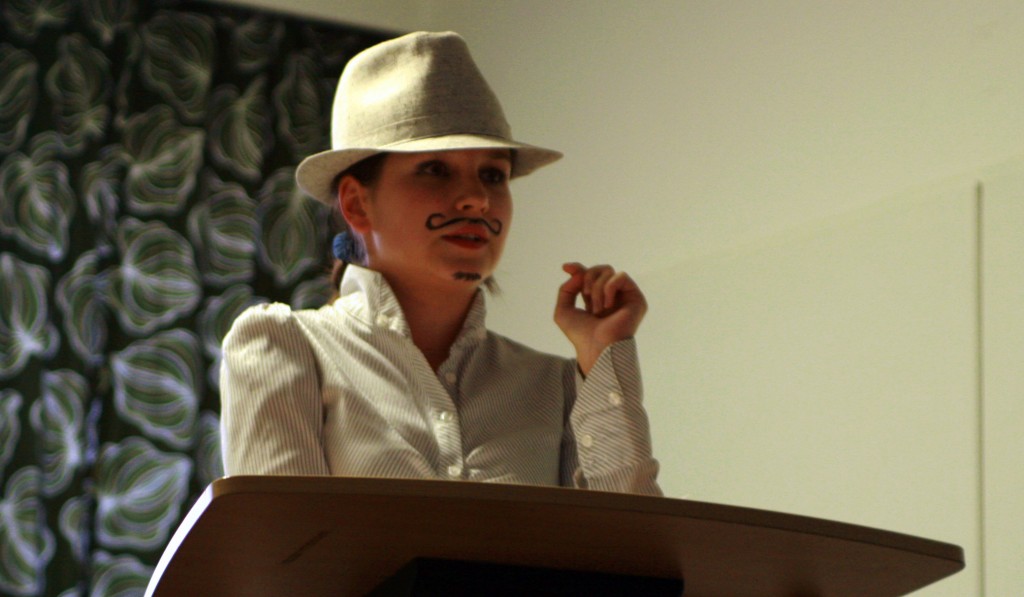After almost three weeks of philosophizing in the company of Montaigne, Seneca, Tolstoy, Machiavelli, Shakespeare and other great minds, we were ready to take on another challenge – the Speech Night. A tradition existing for several years already, this year’s Speech Night is now officially named after the current Romanian Minister of Culture Theodor Paleologu, who is also a former ECLA faculty member.
This year there were four areas in which the speakers had to give 3-minute speeches after only 10 minutes of preparation time. The areas were politics, religion, culture, and economics and each area had three or four contestants. Two of the faculty members, David Levine and Daniel Andersson, decided to take part in the fun and compete against their students. The jury consisted of the ISU faculty members who announced the winners at the end of the contest and awarded them with a bottle of wine or champagne.
The topic which invited the biggest number of participants was religion. What the four students probably did not expect when they signed up for this are was the topic: “God is a tyrant.” However, all four managed to find their way to tackle it. Andrei Decu (Romania) sent out the thoughtful message: “We don’t choose our tyrants, they choose us.” On the other hand, Samantha Perera (USA) said it does not really matter whether god is a tyrant or not because “nobody pays attention“. The two most contrasting opinions were those of Midori Fujita (Japan) and Mykhaylo Kushnir (Ukraine). Midori distinguished between a dogmatic God and a more personal God, concluding: “of course he is [a tyrant].” Mykhaylo, on the other hand, reminded everyone that God created the world with love and improvised a quotation of the Bible: “As God said, ‘Follow me and you will be happy.’” For the discourse on religion, the jury was won over by Samantha’s nihilism.
The speech topic for politics was just as controversial: “Toleration is just another word for weakness.” Here Ali Ozen (Turkey), Ardi Priks (Estonia), and Mariya Ilieva (Bulgaria) went into abstract discussions of what is weakness but in the end they all seemed to agree with Mariya that “Toleration is strength.” The jury also agreed and gave her the first prize.
“Culture is waste” was the unambiguous topic for the discussion on culture. Here Moritz Poesch (Germany) and Nora Georgieva (Bulgaria) had to measure their public speaking abilities against their theater professor David Levine’s. Initially, David seemed to defend the position stated in the topic, but he argued that culture constantly tries to overcome its condition. His final challenge to the public was: “But is waste such a bad thing?”. Nora seemed to head in the same direction as well, but concluded with the modest statement: “Culture is not waste, it’s something a little better.” Moritz, however, was a strong defender of the idea that all culture is waste, basing his argument on the readings we had so far. Although the jury found his speech very entertaining in its irony, they chose to award Nora with the coveted bottle of wine.
In the sphere of economics, the contestants took on the ancient fight whether rich people are happier than poor ones. The topic was “The rich do what they can and the poor suffer what they must.” Diana Constantinescu (Romania) took a creative approach to the topic and appeared as a slightly arrogant and very nonchalant French banker who was sure of one thing: “Virtue was invented by the poor so that they could cope better with suffering”. On the other hand, Jona Dundo (Albania) defended the thesis that being rich is not that good: “We all do what we can and we all suffer what we must.” The students in this category competed against the faculty member Daniel Andersson, whose speech took a musical twist as he based his argument on a quote by Ginger Spice from the Spice Girls. “It is the rich who suffer and the poor who are truly rich,” he concluded. The winner in this category was Jona.
After the awards were handed out, the night took a completely different shape and students and faculty performed music, playing guitar, violin, and piano and singing. This year’s Speech Night ended many hours after it started after performances of songs in many different languages and accompanied by many cheers.
By Nora Georgieva (ISU ’09, Bulgaria)

